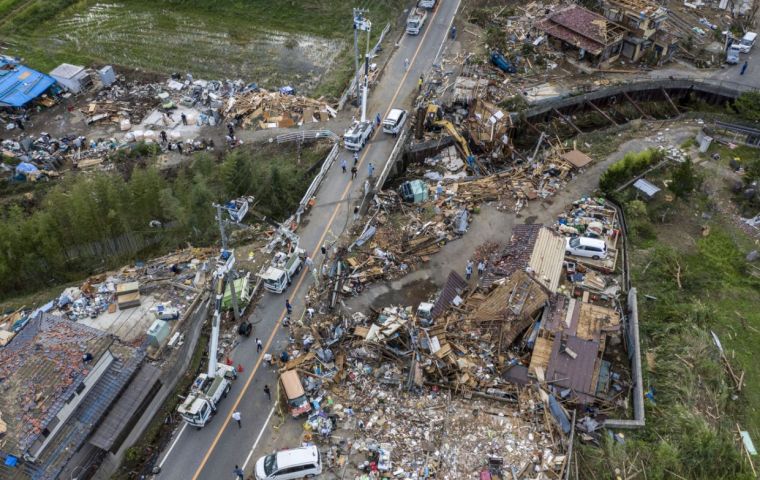MercoPress. South Atlantic News Agency
Typhoon and torrential rains kill 67 in Japan and cause havoc in 36 of 47 prefectures
 Typhoon Hagibis crashed into the country on Saturday night, unleashing high winds and torrential rain across 36 of the country's 47 prefectures
Typhoon Hagibis crashed into the country on Saturday night, unleashing high winds and torrential rain across 36 of the country's 47 prefectures Fresh rain threatened to hamper efforts by tens of thousands of Japanese rescuers searching for survivors after a powerful typhoon that by early Tuesday had killed 67 people.
Typhoon Hagibis crashed into the country on Saturday night, unleashing high winds and torrential rain across 36 of the country's 47 prefectures, triggering landslides and catastrophic flooding.
The death toll from the disaster has risen steadily, and national broadcaster NHK early on Tuesday said 67 people had been killed, according to authorities, while more than a dozen were
still missing.
The government has given lower numbers but was still updating its information.
“Even now, many people are still unaccounted for in the disaster-hit area,” Prime Minister Shinzo Abe told an emergency disaster meeting on Monday.
“Units are trying their best to search for and rescue them, working day and night,” Abe said.
Later in the day, he pledged to “do whatever the country can” for victims and survivors, ordering the defense ministry to call up to 1,000 reserve troops to join 31,000 active forces in search operations.
But rescue work that continued into the night on Monday risked being thwarted by additional rain falling in central and eastern Japan.
“I would like to ask people to stay fully vigilant and continue watching for landslides and river flooding,” Chief Cabinet Secretary Yoshihide Suga told a news conference.
In Nagano, one of the worst-hit regions, officials said they were working cautiously.
“We are concerned about the impact of the latest rain on rescue and recovery efforts,” local official Hiroki Yamaguchi said. “We will continue operations while watching out for secondary disasters due to the current rain.”
Bodies pulled from flooded cars and homes, swollen rivers and landslides all added to the death toll.
The casualties included a municipal worker whose car was engulfed by floodwaters and at least seven crew from a cargo ship that sank in Tokyo Bay on Saturday night, a coast guard spokesman said.
Four other crew, from China, Myanmar and Vietnam, were rescued when the vessel sank and the coast guard was still searching for a last crew member.
Wind gusts from Hagibis reached up to 216 kilometers per hour, but it was the heavy rains that caused the most damage.
A total of 176 rivers flooded, mainly in eastern and northern Japan, local media said.
In central Nagano, a levee breach sent water from the Chikuma river gushing into residential neighborhoods, flooding homes up to the second floor.
Television footage from the area showed patients being transferred by ambulance from a Nagano hospital where some 200 people had been cut off by flooding.
Elsewhere, rescuers used helicopters to winch survivors from roofs and balconies, or steered boats through muddy waters to reach those trapped.
By Monday afternoon, almost 76,000 households remained without power, and water was cut off to 135,000 homes.
The disaster left tens of thousands of people in shelters, many of them unsure when they would be able to return home.
The storm brought travel chaos over the holiday weekend, grounding flights and halting commuter and bullet train services.
By Monday most subway trains had resumed service, along with many bullet train lines. Flights had also restarted.
But NHK reported the swamping of a maintenance yard for the Hokuriku bullet train which connects Tokyo with Nagano. Ten trains were damaged when water levels rose by an estimated four meters, NHK said, citing the train operator.
The storm brought havoc to the sporting world, forcing the delay of Japanese Grand Prix qualifiers and the cancellation of three Rugby World Cup matches.




Top Comments
Disclaimer & comment rulesCommenting for this story is now closed.
If you have a Facebook account, become a fan and comment on our Facebook Page!